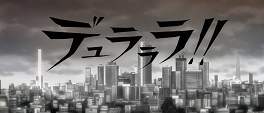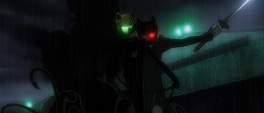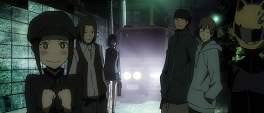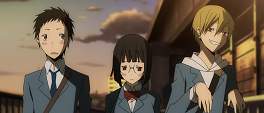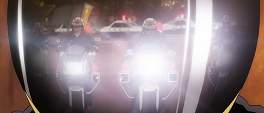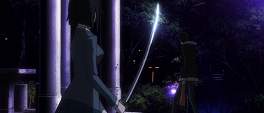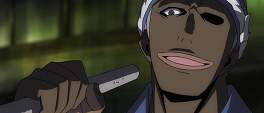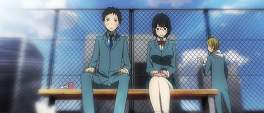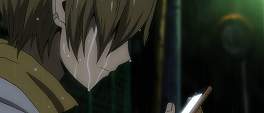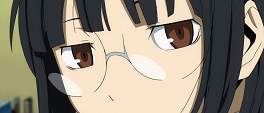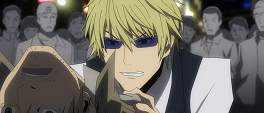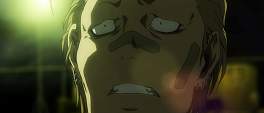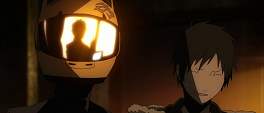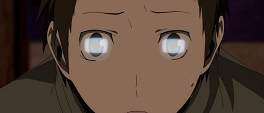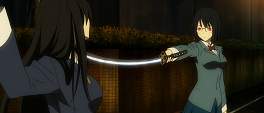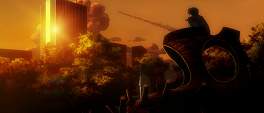One criticism that could never be levelled at Baccano! was that it was unoriginal. So too can this be applied to Durarara!! which defies its lacklustre predecessor by going full bore for a modern thriller with supernatural overtones, eking out some social commentary along the way. Featuring an expansive cast and set in the city-within-a-city, Ikebukuro, the series has an eye for the dramatic and though ostensibly the story is bifurcated, it covers a variety of stories that involve murder, urban gang conflict and domestic abuse through to a love triangle between school friends and a Russian sushi chef's desire for more business. It is a stunningly constructed series and though it has its stumbling points, by and large it demonstrates that with the difficulties of an involving story and an engaging cast down, everything else comes naturally.
When Mikado arrives in Tokyo, his friend Masaomi shows him around Ikebukuro, and though he doesn't realise it, he is now deep within a world populated by an outlandishly strong bartender, a fox-like information broker, a Dullahan on a journey from Ireland to recover her missing head as well as a cornucopia of gang members, students, foreigners and all points in between. The effervescence the city enjoys though is soon ruptured by a brewing street war, leading the charge is the brutish Yellow Scarves who sprung up after the dissolution of the previous ruling gang, the Blue Squares; however a shadowy internet group called the Dollars have also made some headway. Meanwhile a violent sword wielding lunatic has antagonised the Black Rider and it seems someone wishes for all of this conflict to spill over. The city certainly has its share of miscreants but whether its cosmopolitan nature will survive the brewing trouble may just rest in Mikado's hands.
The greatest feat achieved by the series is making Celty, a headless, scythe-wielding Irish spirit of myth, such a supremely endearing character. Without the luxury of eyes or a mouth, Celty speaks through actions and her ever handy mobile phone and it isn't until several episodes in that she is gifted with a voice mostly for the audience's benefit. Initially she is cast as distant and pragmatic, but as we see her home life - sitting dejectedly in pyjamas, transfixed by a television show about aliens and simply interacting with others - she is subtly demystified and it becomes clear despite her headlessness, she has a personality stronger than most series can muster with dozens of unhandicapped cast members. The opening story regarding the search for her head aids in this development showing her as vulnerable and capable of fear and introspection despite her immortality and supernatural abilities. After the conclusion of her story she is wisely sidelined in order to provide other characters with some breathing room. This leaves her perilously close to becoming a deus ex machina however she becomes instrumental in the ongoing conflict which obviates this somewhat.
It is through Celty that much of the series is viewed, no important story is without her and it is telling how many shots are viewed as reflections in her visor. Without an identity beyond that of the Black Rider she mirrors both the city around her and the overarching story, starting out as cautious and combative, she is developed as her history is revealed and her feelings begin to grow until the affection for those around her leads her to action rather than passivity. Those feelings of affection and love underpin all of the primary story threads with a focus on the madness and improbable actions love. Most blatantly seen in the story of Seiji who goes to absurd lengths for his love of Celty's head even taking on Shizuo; or the love between Celty and Shinra, a bizarre pairing between a human and an immortal but also surreal with the knowledge Shinra's father was the one who gave shelter to Celty in exchange for sating his surgical curiosity. Even the trio of highschool protagonists aren't immune with Masaomi's estranged girlfriend irreparably damaged by the Blue Squares gang war and Anri suffering from an unspeakably traumatic childhood event; it's almost refreshing to see the old standby of one-sided adoration from Mikado, even if it is never acted upon it at least isn't perverted and sullied.
Through those three another core message is revealed: communication; whether that's the frequent chat room conversations or Simon's fractured Japanese and deathly serious Russian, the series champions the adulation felt when it flows freely and laments when there is a deficit. Mobile phones are naturally prolific and provide a backbone to story with receiving and sending e-mail on the move crucial to many plot points. The majority of the final arc is dedicated to how much communication matters, the gang war violently escalating as the leaders, once friends, recede further away, not trusting one another enough to be able to confide. What is so brilliantly done though is that none of the actions feel forced - the audience may be privy to the behind the scenes machinations, but as teenagers still tussling with their egos and carving out a place in the world they seem, in context, believable. As Mikado says at the end: "It was, at the same time, very very strange, but also the sort of thing that could happen to anyone."
The foreshadow-build-release methodology is made more apparent in the second half of the series but maintains a common plot by pitching one character as the evil genius behind it all, carefully moving pawns towards some obscure and devious goal. That's the pitch, however although Izaya is often seen lording over the humans he claims to love, however despite his obvious knack for information gathering, his actions are limited to spitting into the maelstrom rather than orchestrating it. Izaya's manipulation of Masaomi is the most tangible demonstration of his ability, everyone else however comes to Izaya voluntarily to ask for information meaning it is difficult to see him truly controlling anything. Both his past and Shizuo's abject hatred of him is left entirely unexplained and his ultimate goal is only obliquely referenced so it is difficult to see him as an antagonist and more a nuisance child with an acute case of megalomania and a god complex.
It is left to Horoda then, a to-the-bone sociopath, to pick up antagonist duties in the second half the series; odd considering the first half managed just fine without one at all. Horoda is representative of a lot of the niggles which plague both halves of the series and boils down to it often overreaching itself. It is obvious from the ending and the lack of conclusion to a select few character's stories that the series exists in a larger narrative that twenty four episodes alone is unable to capture without leaks. The subtleties and pace of development was necessary to maintain the series characteristic atmosphere, but the requirement to provide some conclusion lest a second series never take shape outweighs this. So the introduction of Shinra's father Shingen and the traffic officer Kinnosuke make sense as a wider manoeuvring exercise, setting up for the next grand story, but feel superfluous when they are only present for two episodes at most. Similarly Horoda's ascension to the immediate evil isn't foreshadowed as well as it could have been and is a short term move in a long term game.
Few series deserve a second as much as this does and though it is enticing to think of the possibilities the story has in waiting, it is the characters which are the true draw. Many of them like Anri and Shizuo are rife with pathos and connect on a very personable level such that the end of the series feels less like a conclusion and more a genuine loss. This does not mean the story isn't a rich field for interpretation - the three gangs representing different aspects of society: anonymity, obedience and rebellion; the effect of technology on youths; the lack of mystery and awe in today's urbanised culture - however it pales when compared to the brilliantly handled roster of misfits, oddballs and ne'er-do-wells. The issue stems not from budget or creativity, the vividly sketchy character designs, iconic music and superb production throughout say otherwise, but simply a matter of logistics. Even squeezing twenty four episodes from an untested series was risky.
It's difficult not to see Durarara!! as what Baccano! should have been. All of the constituent components are the same down to the director, studio and creative crew, but it is the composition that makes this stand out. Being underivative means it has no peers to challenge and no genre shoes to fill and that originality promotes its status as iconic even further. Thoroughly engaging, brilliantly structured and some of the best characters and most climactic scenes for quite some time. The hope for a second season may be high but this outpaces its limited flaws and is resolutely a must watch series.
